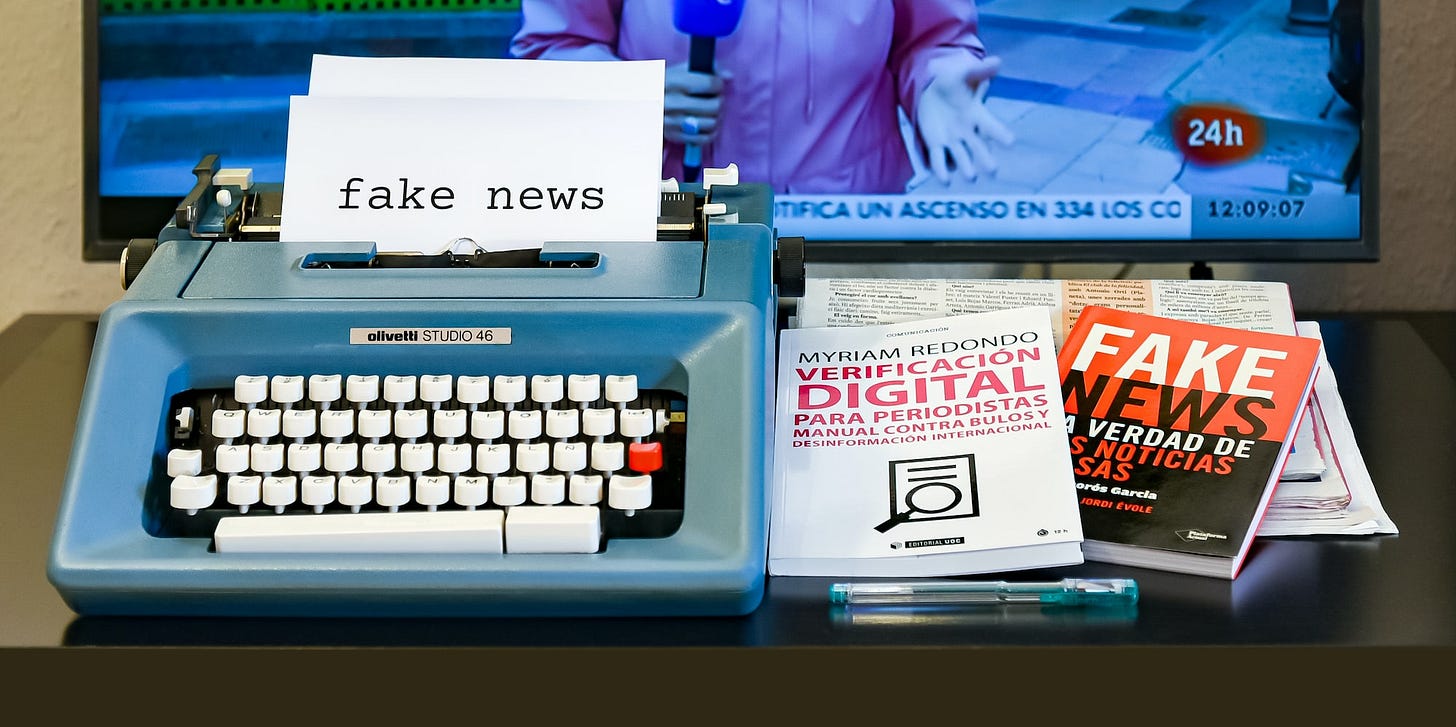Twitter Has Completed Its Transformation to an Information Warfare Platform
Beware the blue checks.
For the past decade, Twitter has been a ubiquitous presence in the American public discourse, providing a platform for people to share their opinions, connect with others, and stay informed about world events. However, under the ownership of Elon Musk, Twitter has undergone a series of changes that have raised important, growing concerns about national security, the integrity of our information environment, and the spread of disinformation and propaganda.
In this article, we will examine risks associated with Twitter's changed ownership which has made the platform more vulnerable to the spread of propaganda, disinformation, and extremist views. We will review Twitter's impact on the 2020 presidential election and explore the potential impact of recent changes to the upcoming 2024 presidential election.
As the world becomes increasingly reliant on social media for news and information, the potential risks associated with Twitter's changes under Elon Musk's ownership cannot be ignored. This article aims to provide an overview of the national security concerns and information warfare risks associated with the platform and their potential impact on democratic discourse and the upcoming presidential election.
US National Security
Elon Musk's $44 billion acquisition of Twitter in late 2022 sent shockwaves through the tech industry and raised concerns about the platform's integrity and reliability as a source of news and information. As an inveterate Twitter user for the past decade, I have seen the platform undergo a series of radical changes under Musk's leadership, changes that have clearly rendered it increasingly vulnerable to manipulation by state propagandists and paid influence actors.
One of the most significant concerns raised by Musk's acquisition of Twitter is the potential for national security risks. The involvement of foreign investors from China and the Middle East in the deal has sparked fears of foreign manipulation of the platform and access to user data. This has prompted some members of the Biden administration to consider subjecting the Twitter deal to review by the US Committee on Foreign Investment (CFIUS), which can block business transactions that pose national security risks.
Additionally, Musk's ties to foreign powers, such as China and Russia, have raised concerns within the government. With Tesla's factory in Shanghai accounting for over half of its global production last year and Musk's dependence on Middle Eastern financing for the Twitter deal, the administration seems worried that he may be vulnerable to foreign influence. Furthermore, Musk's political alliances have raised concerns about his influence over US policy, particularly in relation to China and Ukraine.
Concerning Changes
The recent changes introduced to Twitter by Elon Musk have raised concerns about the platform's ability to maintain its integrity as a reliable source of information. I provide a basic analysis of how these changes might benefit those with malicious intentions on Twitter:
Removal of Blue Checkmarks and Verification System
The elimination of the blue checkmark system, which verified accounts of public officials, government agencies, and celebrities, has created a fertile ground for impersonation. Users can no longer depend on verified accounts to differentiate between credible sources and fraudulent ones. This change has facilitated propagandists in impersonating legitimate news organizations or experts, creating confusion and spreading misinformation. The removal of this credibility marker means users must exercise increased caution when assessing the legitimacy of information on the platform, creating an environment ripe for disinformation.
💡 Since users can no longer rely on the blue checkmark to identify authentic accounts, it becomes much easier for malicious actors to deceive users and gain credibility.
Elimination of State-Affiliated Media Labels
Musk's decision to remove labels identifying state-owned media, including those controlled by authoritarian states, has blurred the lines between independent journalism and state-controlled media. This makes it harder for users to discern the source and potential biases of the information they consume.
💡 State propagandists can exploit this confusion to disseminate their messages more effectively, as users may unknowingly interact with and share content from state-controlled media outlets.
Increased Visibility for Paid Subscribers
With the introduction of the paid subscription model, Twitter now offers paid subscribers increased visibility and prioritized rankings in conversations and search results. Malicious actors can now artificially amplify their messages and increase their reach, potentially swaying public opinion in their favor.
💡 This feature can be exploited by propagandists and influence campaigners who are willing to pay high prices for greater visibility.
Laissez-Faire Approach to Free Speech
The diminished content moderation on Twitter has led to a rise in conspiracy theories and the spread of extremist views. With less oversight, malicious actors can more easily disseminate their ideas and manipulate public opinion, compromising the platform's ability to offer a secure and trustworthy space for discourse. Musk's inconsistent policies regarding speech have created an environment where certain content may be censored, while other harmful content may be allowed to flourish.
💡 This ambiguous approach can benefit malicious actors, as they can exploit the platform's lax enforcement to disseminate their messages without facing consequences.
Erosion of Trust in Public Institutions
The changes implemented by Musk, combined with his own efforts to denigrate institutions of government and media, have contributed to the erosion of trust in public institutions, making it easier for propagandists and influence campaigners to sow discord and manipulate public opinion.
💡 As users become more skeptical of the information they encounter on the platform, they may become more susceptible to the narratives pushed by malicious actors.
Playing Defense
To counteract these negative effects, users must exercise caution when consuming information on Twitter and be vigilant in identifying and reporting suspicious accounts and content.
However, a significant number of users have observed that reporting appears to yield little to no results, that the effectiveness of the Birdwatch feature has declined since its transition to Community Notes, that the majority of blue check accounts engaging in politically-charged threads seem to harbor malicious intent, and that the For You tab increasingly promotes contentious subjects beyond the user's typical interests.
The human brain, while remarkable in many ways, is ill-equipped to withstand the cognitive barrage stemming from UI/UX dark patterns, the misappropriation of our private data for psychological targeting—as exemplified by the Cambridge Analytica scandal—and the relentless efforts to deceive or implant beliefs.
These vulnerabilities are particularly concerning within the context of the 24-hour news cycle, where information overload and constant exposure to various sources can make it exceedingly challenging for individuals to discern fact from fiction, resist manipulation, and maintain a factual perspective. Our cognitive defenses are simply outmatched by the sophistication and persistence of those who seek to exploit these inherent limitations for their own gain.
💡 For most people, the best solution may be to leave the platform altogether.
Impact on US Elections
Twitter has undeniably revolutionized politics, enabling direct engagement between politicians and constituents, bypassing traditional media. This increased transparency and engagement come with vulnerabilities to manipulation and disinformation. Elon Musk's acquisition of Twitter raised concerns among researchers and activists, as bad actors may exploit these weaknesses to compromise the integrity of future elections. Foreign adversaries and powerful domestic actors can use Twitter to implant false beliefs, manipulate public opinion, sow division, undermine democracy, and even incite violence.
💡 Destabilization is a primary goal of some deeply malicious actors who stand in opposition to a stable, healthy, democratic United States of America.
In the 2020 US presidential election, Twitter influenced politics and public sentiment, but also facilitated misinformation, conspiracy theories, and foreign interference. Countries like Russia and Iran orchestrated disinformation campaigns, undermining democracy and fostering discord. The platform's impact on the 2024 election is expected to be substantial, as it continues to shape public opinion and enable foreign interference.
Malicious actors will attempt to sway election outcomes, leveraging the absence of national data privacy laws, a polarized political environment, psychological weaknesses, and cognitive biases. By skillfully utilizing Twitter's rapid, viral information dissemination, they can deepen divisions among voters, propagate harmful content, and further weaken trust in the democratic system.
💡 I predict that without some outside intervention, Twitter's evolution into a powerful tool for information warfare will further erode trust in elections and deepen divisions among the public.
As the 2024 election approaches, candidates and parties must navigate a landscape rife with fake news, propaganda, and paid trolls. While the platform is poised to impact the political landscape and election outcomes, its future influence on US politics remains uncertain due to escalating foreign interference risks and the low likelihood the government will move to contain them.
Conclusion
Twitter's impact on domestic US elections is multifaceted, presenting both opportunities for increased engagement and challenges posed by the potential for misinformation and manipulation. Elon Musk's purchase of the platform and the subsequent changes have intensified these risks, allowing bad actors to exploit vulnerabilities in our cognition and democratic processes more effectively.
As described by journalist Heidi Cuda in the Byline Supplement in December 2022:
When Twitter owner Elon Musk Tweeted his support for returning Crimea to Russia, Russian analyst Fiona Hill accused Musk of actively transmitting a message on behalf of Putin. Canadian academic Michael MacKay agreed, describing it as ‘active measures’ - a term used to describe how the Soviet Union used covert disinformation operations.
“Elon Musk is turning Twitter into VKontakte, the Russian information warfare outlet disguised as a social media platform”, MacKay told Byline Supplement.
These claims have to be taken seriously. Hill is a foreign affairs specialist who was a witness during the first impeachment of Donald Trump, and MacKay is a noted Ukraine expert with a PhD in political philosophy from the London School of Economics.
“Under the guise of ‘free speech’ Musk’s purpose is to destroy civil speech – genuine communication that connects people”, MacKay explained. “Musk and Kremlin propaganda do not present a point of view. They seek to destroy the idea that truth and a shared experience of reality exist.”
I believe it is crucial for policymakers, despite having failed to address the hostile takeover of Twitter Inc., to address these future challenges to better preserve the integrity of our elections and democratic system.
I plan to publish an analysis of the RESTRICT Act in a future post.
Thanks for reading. Please share this with your network.



